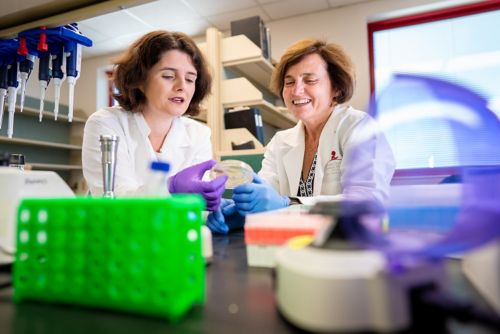St. Jude Family of Websites
Explore our cutting edge research, world-class patient care, career opportunities and more.
St. Jude Children's Research Hospital Home

- Fundraising
St. Jude Family of Websites
Explore our cutting edge research, world-class patient care, career opportunities and more.
St. Jude Children's Research Hospital Home

- Fundraising
About the Guenther Lab
Challenging cancers require unique treatment approaches. To unravel the diverse makeup of osteosarcoma, the most common malignant bone tumor in children, our laboratory examines the genetic drivers behind this aggressive disease. We use genome-scale screening techniques and conduct investigations in diverse models to understand the spectrum of osteosarcoma. Leveraging our knowledge of osteosarcoma’s genetic landscape, we also investigate new combination approaches to treatment. With these experiments, our hope is to uncover highly effective therapeutic strategies for children with osteosarcoma.

Our research summary
Osteosarcoma is a tumor with an incredibly complex genome, marked by mutations and diverse chromosomal rearrangements. Such genomic heterogeneity contributes to unique molecular drivers in individual tumors that can present challenges to effective treatment. Dr. Guenther’s ongoing research, which uses genome-scale CRISPR screening in cancer cell line models to examine critical non-mutated genes in the osteosarcoma cancer genome, has revealed that different elements of the DNA damage cascade may be important in different subsets of osteosarcoma. As the complex genome underlying osteosarcoma tumors seeks to replicate and proliferate, the DNA damage response cascade may play a critical role. A major theme of Dr. Guenther’s work at St. Jude will seek a deeper understanding of these DNA damage-related targets in osteosarcoma.
A major focus of the early efforts in the Guenther laboratory will be the preclinical validation of one such target, which is a helicase enzyme involved in replication stress response. Based on preliminary data, Dr. Guenther hypothesizes that osteosarcoma tumors that are more dependent on this gene may be more sensitive to certain types of DNA damage response or checkpoint inhibitors. Dr. Guenther’s work will concentrate on validating these findings in a variety of murine models and PDXs available at St. Jude. The validation of these models may lead to an understanding of whether this is a potential niche for osteosarcoma treatment in some patients.
The Guenther laboratory will also exploit genomic screening technologies in other ways, such as the identification of drug-drug combinations and drug-resistant mechanisms to targeted agents in bone sarcomas. The goal of this research is to validate novel combination strategies using in vitro and in vivo models, potentially leading to clinical trials.
The theme of Dr. Guenther’s research at St. Jude will center around the investigation of promising osteosarcoma dependency genes, including those involved in DNA damage repair. By understanding how these genes influence disease progression, she hopes to find ways to harness cancer cell vulnerabilities that will transform osteosarcoma treatment.

Find out more
Selected publications
Contact us
Lillian Guenther, MD
Molecular Oncology
MS 353, Room D5062D
St. Jude Children's Research Hospital
Follow Us

